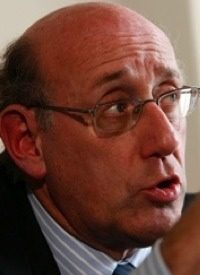
Kenneth Feinberg, the Obama administration’s “pay czar,” is expected to announce a plan next week that will slash the annual salaries of top executives at the seven largest companies that received federal bailouts.
CNN reported on October 21 that a senior administration official told them about the plan to drastically reduce compensation for 175 executives at AIG, Bank of America, Chrysler, Chrysler Financial, Citigroup, General Motors, and GMAC. Annual salaries for these executives are expected to fall 90 percent on average, with the top 25 highest paid employees at each firm getting an average cut of 50 percent.
The cuts will supposedly help these companies to pay back the bailout money they received as quickly as possible. CNN said that another source in the Treasury Department believes Feinberg is “trying to strike the balance” between looking after taxpayers and permitting the bailout recipients to “grow their way out of TARP.”
The Wall Street Journal has reported that Feinberg will order changes in organizational structure, such as forbidding the same person to be both chief executive officer and chairman. Other reports indicate that the plan will be especially hard on AIG’s Financial Products division, which was responsible for the company’s downfall. No one there is expected to take in more than $200,000 in total compensation.
Last week Feinberg “suggested” to outgoing Bank of America CEO Ken Lewis that he should refuse to take a salary or bonus for 2009. Lewis acquiesced, though he should still receive a minimum of $53 million in pension benefits when he retires.
Some executives have opted for preemptive action. For example, Citigroup chief Vikram Pandit made it known earlier this year that he would take an annual salary of $1 with no bonuses until his company is profitable again. To get an idea of the magnitude of this pay cut, Pandit received compensation worth $10.8 million in 2008.
As for commentary on the matter, the Treasury Department, AIG, Bank of America, Chrysler Financial, and GM reportedly had nothing to say. Chrysler, Citigroup, and GMAC were somehow unavailable for comment.
Some experts have expressed concern that the government’s interference will only further hurt these firms, driving the most talented individuals to seek employment with other companies not subject to Feinberg’s heavy hand. JPMorgan Chase and Goldman Sachs would certainly be willing to consider hiring any who are truly skilled.
Instead of letting the free market decide what firms remain in business and which employees perform well enough to retain their jobs, the government has interjected itself as the final arbiter. Ironically, by creating large financial incentives for executives to go elsewhere, the government may be setting up companies to fail and almost guaranteeing that they will be back groveling for more bailout money in the future.
Photo of Kenneth Feinberg: AP Images



